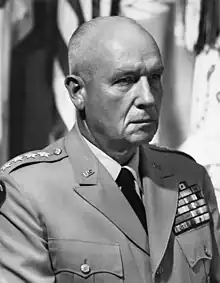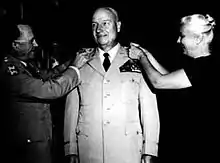Carter B. Magruder
Carter Bowie Magruder (April 3, 1900 – March 14, 1988) was a United States Army general who served concurrently as Commander in Chief, United Nations Command/Commander, United States Forces Korea/Commanding General, Eighth United States Army (CINCUNC/COMUSFK/CG EUSA) from 1959 to 1961.[1][2]
Carter B. Magruder | |
|---|---|
 | |
| Born | April 3, 1900 London, UK |
| Died | March 14, 1988 (aged 87) Walter Reed Army Medical Center, Washington, D.C., U.S. |
| Buried | |
| Allegiance | |
| Service/ | |
| Years of service | 1918–1961 |
| Rank | |
| Commands held | United Nations Command U.S. Forces Korea Eighth U.S. Army IX Corps 24th Infantry Division |
| Battles/wars | World War I World War II Korean War |
| Awards | Distinguished Service Medal (3) |
| Other work | Logistics consultant |
Early life and education
_at_West_Point_in_1923.png.webp)
Magruder was born in London, United Kingdom, where his father, Dr. George Mason Magruder, was serving with the United States Public Health Service. Magruder's later returned to the U.S. and settled in Albemarle, Virginia, where young Carter graduated from the high school. At the time of the U.S. entry into World War I, he was attending the University of Virginia. He dropped out of college and after period of training at the Officers Training Camp in Plattsburgh, New York, he was commissioned an infantry second lieutenant on September 16, 1918.[3][4]
With the end of the war, Magruder accepted an appointment to the United States Military Academy. Upon graduation in 1923, he was commissioned in the field artillery. Later he attended Purdue University and received a master's degree in mechanical engineering in 1932. Prior to World War II, he served at various posts and assignments and also attended the Command and General Staff College and Army War College.[3][4]
World War II
In June 1941, Magruder was assigned to the Office of the Assistant Chief of Staff for logistics (G-4), War Department General Staff in Washington, D.C., where he served under then-Major General Brehon B. Somervell. During his service there, Magruder was promoted to lieutenant colonel on December 21, 1941. Upon the creation of Army Service Forces under General Somervell in March 1942, Magruder was appointed Director of Planning Division, Army Service Forces and was promoted to colonel on December 12, 1942. While in this capacity, he planned and supervised the logistic support from the United States for overseas operations and gained the reputation of Army's top logistician. Magruder was present at the Casablanca, Cairo, and Quebec conferences and later was decorated with Army Distinguished Service Medal for his service in this capacity.[1][5][6][3][4]
Following the promotion to brigadier general on August 13, 1944, Magruder was ordered overseas and assumed duty as Assistant Chief of Staff for logistics (G-4) on the staff of Commanding General, Mediterranean Theater of Operations, Dwight D. Eisenhower. He was in charge of supply, transportation, and construction in that theater, stationed in Italy and was promoted to major general on March 24, 1945. Magruder later received his second Army Distinguished Service Medal for his service in the Mediterranean and also was decorated by the governments of France, Italy and Great Britain.[1][5][6][3][4]
Postwar service

In November 1945, Magruder was transferred to the European Theater of Operations and assumed duty as Chief of Staff, Services of Supply under Lieutenant General John C. H. Lee. He later succeeded Lee and upon the reorganization of postwar allied forces, Magruder assumed duty as Assistant Chief of Staff for logistics (G-4), United States European Command under General Joseph T. McNarney.[1][6][4]
While in this capacity, Magruder was stationed in Frankfurt and was charged with the destruction of German equipment and fortifications, the repatriation of slave labor and displaced persons and the release of prisoners of war. He later served as Chief of Staff of the European Command under General Lucius D. Clay until March 1949, when he returned to the United States for duty at the Pentagon. Magruder served as deputy to the Assistant Secretary of the Army, Tracy Voorhees.[1][6][4]
Magruder then served as Deputy Assistant Chief of Staff for Logistics until November 1953, when he was ordered to the Far East for duty as commanding general, 24th Infantry Division and in 1954 was promoted to lieutenant general. He then assumed command of IX Corps and returned to the United States in 1955 for duty as Assistant Chief of Staff of the Army for Logistics, the highest logistics position in the Army.[1][4]
Promoted to full general in 1959, Magruder returned to Korea to command all United Nations and U.S. forces. During his command, a military junta led by Park Chung-hee overthrew the elected premier, John Chang. Magruder was publicly criticized by retired General James Van Fleet for ordering South Korean officers to stay loyal to the civilian government. Van Fleet, who supported the coup, said that Magruder "acted illegally", and:
Those ROK generals who refused to go along with the coup should have disobeyed his order ... It's all right to talk about representative government, but except in great countries like the U.S. and Great Britain, such a system lets elements get into the government and destroy it in underdeveloped countries where the enemy is lurking.[7]
Magruder retired from the Army in June 1961 after almost 43 years of active service and received his third Army Distinguished Service Medal for his service as commanding general, United Nations Command in Korea.[5][8]
Later life and death
After retiring from the Army, Magruder worked as a logistics consultant to the Department of Defense and private industry. He settled in Arlington, Virginia, and was a member of the Army-Navy Country Club and the Society of the Cincinnati.[3]
He died at the age of 87 of lung ailments on March 14, 1988, at Walter Reed Army Medical Center and was buried in Arlington National Cemetery. His wife, Luella Johnson Magruder (1907–1991) was buried with him in 1991.[9]
Decorations
Here is the ribbon bar of General Magruder:[5][6]
Notes
- "Biography of GEN Carter Bowie Magruder, USA". generals.dk. generals.dk Websites. Retrieved April 12, 2017.
- "Recurring logistics probles: As I have observed them by General Carter B. Magruder" (PDF). history.army.mil. U.S. Army Military History Division Websites. Retrieved April 12, 2017.
- "Retired Army Gen. Carter Magruder Dies". The Washington Post. Retrieved April 12, 2017.
- "West Point Association of Graduates - Carter B. Magruder, Class 1923". westpointaog.org. West Point Association of Graduates Websites. Retrieved April 12, 2017.
- "Valor awards for Carter B. Magruder". Military Times. Retrieved April 12, 2017.
- "Yearbook American Clan Gregor Society - Major general Carter B. Magruder, pages 62-63" (PDF). Military Times. American Clan Gregor Society Websites. Retrieved April 12, 2017.
- "Rocking the Boat" Time. July 28, 1961.
- "Magruder to Leave Post Soon". The New York Times. May 23, 1961. p. 9. Retrieved June 19, 2018.
- Burial Detail: Magruder, Carter B – ANC Explorer
External links
- Carter B. Magruder at ArlingtonCemetery.net, an unofficial website
- Generals of World War II